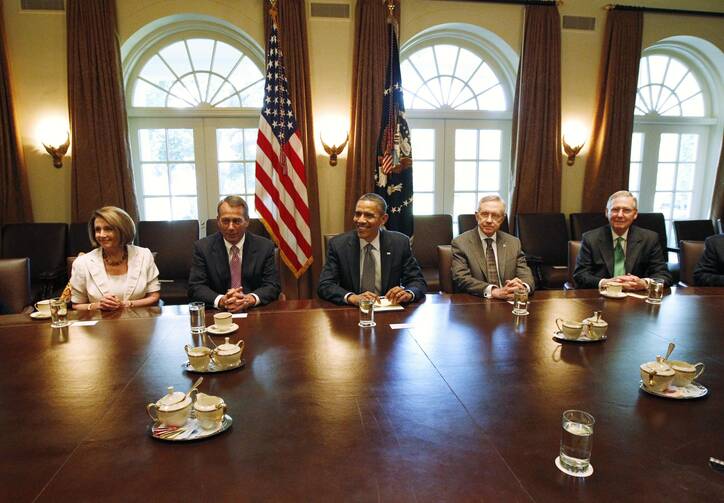Making fun of New York Times columnists is like tickling fish in a barrel — they hardly notice and they're not going anywhere — but Monday’s piece by David Brooks, “Snap Out of It,” is too foolish to ignore.
Brooks tells us to shake off the “despondency and passivity,” the “pessimism and fatalism” sweeping America. “The scope of the problems we face are way below historic averages,” he writes. “We are living in an amazingly fortunate time."
This view is not unique to Dad Columnists who smoked pot so you never have to. Comedian Louis CK channels it in his celebrated routine (“Everything’s Amazing and Nobody’s Happy”) on people complaining about spotty wi-fi service during a jet flight. The band Wilco has a great song, “You Never Know,” that tweaks adolescent pessimism. (“Every generation thinks it’s the end of the world … It’s a fear we transcend/That we’re here at the end.”) So I’m with Brooks here.
His antidote to American moodiness isn’t so attractive. “We … happen to be living during a leadership crisis,” Brooks writes, “and a time when few people have faith in elites to govern from the top.” The solution: “We need to get over the childish notion that we don’t need a responsible leadership class, that power can be wielded directly by the people.”
There’s an air of straight talk to this, kind of like a stand-up comic boasting that political correctness won’t stop him from saying that men and women really are different. But it boils down to David Brooks saying that his friends would be swell people to put in charge.
“America was governed best when it was governed by a porous, self-conscious and responsible elite,” he writes, “during the American revolution, for example, or during and after World War II.” That is, during times when Americans were in constant anxiety about the survival of their nation.
During and after World War II, this responsible elite put Japanese-Americans in internment camps, condoned blacklisting and McCarthyism, and suppressed the African-American civil rights movement until segregation became an international embarrassment in the Cold War. It’s a testament to the strength of American political institutions that democracy survived the Great Depression, but I hesitate to give credit to the ruling class for reining in the people’s worst impulses. It may have been the reverse.
Brooks cautions that “privilege imposes duties” and suggests, “Powerful people might follow a code of public spiritedness.” He does not mention a duty to pay taxes without crying Nazism, let alone a duty to pay a fair share of taxes. He does not mention the support of universities or museums or any kind of philanthropy. Instead, he counsels the rich to dial it back a bit for appearance’s sake: “No luxury cars for college-age kids. No private jet/ski weekends. Live a lifestyle that is more integrated into middle-class America than the one you can actually afford.” The same advice could apply to mobsters who don’t want to provoke the feds. (You can run the country, but keep living in that house in Queens!)
From Brooks’s point of view, another problem with déclassé politics is that the common people take things too seriously: “In 1960, 5 percent of Republicans and 4 percent of Democrats said they would be displeased if their children married someone of the opposite party. By 2010, Cass Sunstein observes, those numbers had jumped to 49 percent and 33 percent.” I see this as a sign that people are less intimidated by pollsters these days, and more willing to give answers that don’t come out of a civics text. Even so, “displeased” is a mild word; it’s not as if the respondents said they would disinherit their children. (And according to the recent Ken Burns documentary on the Roosevelts, the Democratic and Republican branches of the powerful family weren’t just displeased by each other. They were pissed.)
But it’s also true that the two major parties weren’t as clearly defined in 1960. The Republicans included big-government proponents like Nelson Rockefeller, and the Democrats included hard-core racists. Brooks’s responsible elite tried to minimize differences between the parties, which sometimes yielded legislative compromises and sometimes just led to inaction on issues people cared about. Political organizing, including protest marches and civil disobedience, helped to bring about progress on civil rights and environmental protection when the elite dragged their feet. Brooks is generally a reasonable sort, so I don’t think he would suggest that we needed more incidents like the shooting of protesters at Kent State, but I don’t know how else we could have kept people from questioning the legitimacy of the ruling class.
Is a lack of faith in the ruling class the reason we haven’t made progress in addressing climate change? This past weekend’s march in New York suggests instead that citizens will have to pressure governing institutions to act. A lack of trust in the elite is more than warranted and not at all childish.








